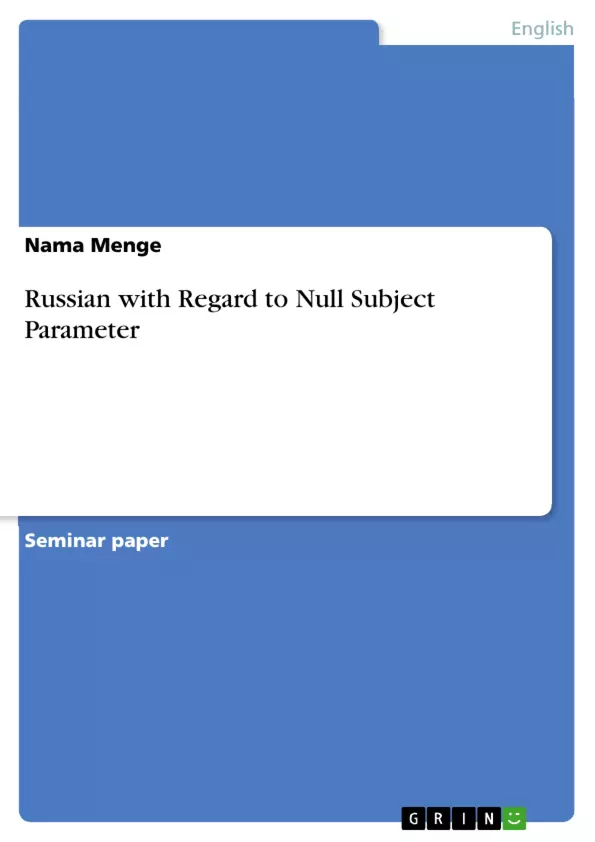This seminar work examines the pro-drop parameter on the examples of Italian being the standard pro-drop language compared to Russian language. The emphasis is on the problem whether Russian is a null subject language or not and if it is one, is it a classical or a partial one.
The paper is organised as follows. The first section gives a brief overview of the theoretical background. The second section analysis the data, which is discussed in the following section. Finally, the conclusions are maid in the final chapter.
“Ever since the ground-breaking observations of Perlmutter (1971), the contrasts between languages that allow subjects of tensed sentences to be null [...] and those that do not [...] has been a classic problem for any serious theory of linguistic typology.“ (Jaeggli, Safir 1989). The null subject phenomena still catches more and more interest in linguistic researches owing to the observations of multiple correlations between the null subject property and other syntactic phenomena (ibid.).
Slavic languages received and still receive very little attention within the government and binding theory / universal grammar. From the perspective of the null subject parameter, Slavic languages should be very attention catching because of their diversion. Especially Russian represents an interesting case. Till this days, linguists all over the world can not decide whether ist is a null subject language or not, whether it is a partial null subject language or something different.
Inhaltsverzeichnis (Table of Contents)
- Introduction
- Theoretical Background
- Chomsky's Universal Grammar Approach and the Role of the Parameters
- Null Subject Parameter and Null Subject Languages
- Data Analysis
- The Realisation of the Null Subject Parameter in Italian
- Russian with Regard to Null Subjects
- Discussion
- Conclusion
Zielsetzung und Themenschwerpunkte (Objectives and Key Themes)
This seminar work investigates the pro-drop parameter using Italian as a standard pro-drop language and comparing it to Russian. The primary focus is on the question of whether Russian is a null subject language, and if so, whether it is a classical or a partial null subject language. The paper aims to analyze the linguistic characteristics of both languages, examine the theoretical underpinnings of the null subject parameter, and draw conclusions about the nature of null subjects in Russian.
- Null Subject Parameter
- Pro-drop Languages
- Universal Grammar
- Comparative Linguistics
- Syntactic Variation
Zusammenfassung der Kapitel (Chapter Summaries)
- Introduction: The introduction sets the stage by discussing the significance of the null subject phenomenon in linguistic typology and highlights the particular interest in Slavic languages, especially Russian, due to its ambiguous status as a null subject language.
- Theoretical Background: This chapter provides an overview of Chomsky's Universal Grammar theory, focusing on the concept of parameters and their role in explaining language variation. It delves into the Null Subject Parameter, explaining its distinction between languages that permit null subjects and those that do not.
- Data Analysis: This section examines the realization of the Null Subject Parameter in Italian, a canonical null subject language. It analyzes the syntactic properties of Italian that distinguish it from English, illustrating how Italian allows for null subjects and subject-verb inversion, while English does not.
Schlüsselwörter (Keywords)
This paper focuses on the Null Subject Parameter, pro-drop languages, Universal Grammar, comparative linguistics, syntactic variation, Italian, Russian, and linguistic typology.
- Citar trabajo
- Nama Menge (Autor), 2019, Russian with Regard to Null Subject Parameter, Múnich, GRIN Verlag, https://www.grin.com/document/1243286



